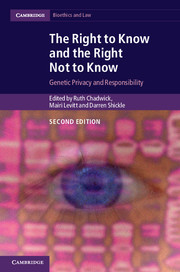Introduction
Published online by Cambridge University Press: 05 September 2014
Summary
The first edition of The Right to Know and the Right Not to Know was published in 1997 as an output of the Euroscreen projects (1994–6; 1996–9), funded by the European Commission. The idea for the book emerged over dinner at a conference in Turku, where Ruth Chadwick had given a talk on the topic of the right to know and the right not to know, and discussion in the management team of Euroscreen concluded that there were so many interesting associated issues that a volume could and should be prepared. As the publication was an output of a project on genetic screening, it did not seem necessary to specify in the title that the issues were to be understood in the genetic context. At the time, it was a hot topic in genetics: in the 1990s there had been much discussion about disclosure (or not) in the clinic. At the beginning of the decade, for example, the Royal College of Physicians published its Ethical Issues in Clinical Genetics (1991), which identified a number of possible scenarios, and in the same year the results of the empirical survey of disclosure dilemmas, conducted by Dorothy Wertz and John Fletcher, was published in the journal Bioethics (Wertz and Fletcher 1991).
There had been developments, however, in the 1980s, which paved the way for discussions related to wider population screening (Shickle and Harvey 1993). The Nuffield Council on Bioethics published its report on genetic screening in 1993. Of the two Euroscreen projects that were funded by the European Commission, the first (1994–6) examined ethical issues in predictive medicine. The second was concerned with insurance, commercial testing and public awareness. Clearly, issues of rights to know and not to know were implicated in all of these, in different ways.
- Type
- Chapter
- Information
- The Right to Know and the Right Not to KnowGenetic Privacy and Responsibility, pp. 1 - 10Publisher: Cambridge University PressPrint publication year: 2014



